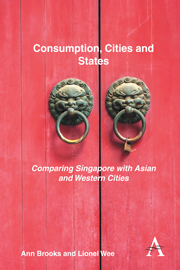Book contents
- Frontmatter
- Contents
- Acknowledgments
- Introduction
- Chapter 1 Consumption, Reflexivity and Citizenship in Global Cities
- Chapter 2 Orders of Reflexivity
- Chapter 3 Rescaling for Competitiveness
- Chapter 4 The Dynamics of State–Society Negotiations
- Chapter 5 (De-)Regulating Asian Identities: Comparing Asian Cities and States
- Chapter 6 Citizenship, Reflexivity and the State: Investigating ‘Defensive Engagement’ in a City-State
- Chapter 7 Governing the Citizen-Consumer: Citizenship, Casinos and ‘Cathedrals of Consumption’
- Chapter 8 Regulating Consumption and the ‘Pink Dollar’
- Chapter 9 States as ‘Midwives’ to Cities: Cosmopolitanism, Citizenship and Consumption in the Modern State
- References
- Index
Chapter 8 - Regulating Consumption and the ‘Pink Dollar’
Published online by Cambridge University Press: 05 September 2014
- Frontmatter
- Contents
- Acknowledgments
- Introduction
- Chapter 1 Consumption, Reflexivity and Citizenship in Global Cities
- Chapter 2 Orders of Reflexivity
- Chapter 3 Rescaling for Competitiveness
- Chapter 4 The Dynamics of State–Society Negotiations
- Chapter 5 (De-)Regulating Asian Identities: Comparing Asian Cities and States
- Chapter 6 Citizenship, Reflexivity and the State: Investigating ‘Defensive Engagement’ in a City-State
- Chapter 7 Governing the Citizen-Consumer: Citizenship, Casinos and ‘Cathedrals of Consumption’
- Chapter 8 Regulating Consumption and the ‘Pink Dollar’
- Chapter 9 States as ‘Midwives’ to Cities: Cosmopolitanism, Citizenship and Consumption in the Modern State
- References
- Index
Summary
Introduction
This chapter considers a second case study, one that highlights the significance of discreet consumption as analytically relevant to our understanding of political consumerism. This second case study focuses on broadening the understanding of consumption across a range of heterogeneous populations in different cities. O'Connor and Kong (2009) put this in the broader context of the rise of the cultural and creative industries and their recognition in national and global city agendas. As they note: ‘The increasing importance of cultural and creative industries in national and city policy agendas is evident in Hong Kong, Singapore, Taiwan, South Korea, Beijing, Shanghai and Guangzhou, and Wuhan. Much of the thinking in these cities has derived from the European and North American policy landscapes’ (2009, 1).
This idea of the growth of ‘creative clusters’ (see Kong 2009 for the development of this concept in the context of Singapore) is linked to the notion of the ‘creative class’ (Florida 2005), described by O'Connor and Kong as ‘one of the most significant forms of direct policy transfer seen in the last few years. From its use by US academic Richard Florida as a form of statistical civic boosterism tacked onto some loose claims about the ending of the industrial society, it has gone on to enthuse urban politicians and planners across the globe’ (2009, 3). We are not claiming that heterogeneity is purely a feature of the growth of the ‘creative classes’ or the creative industries.
- Type
- Chapter
- Information
- Consumption, Cities and StatesComparing Singapore with Asian and Western Cities, pp. 131 - 152Publisher: Anthem PressPrint publication year: 2014



